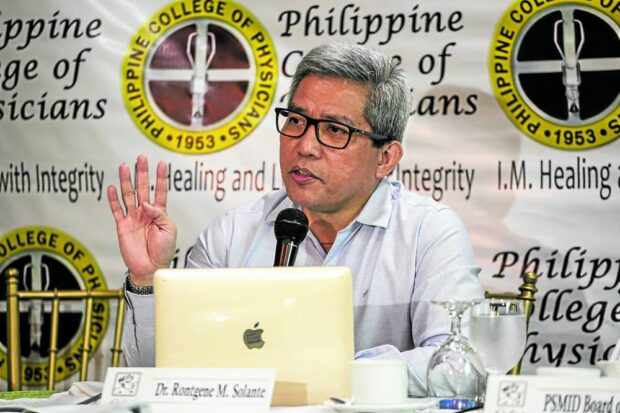Head of docs’ group: No need to hire foreign MDs for ‘tech transfer’

Dr. Rontgene Solante
For the head of the Philippine College of Physicians (PCP), there is no need for the country’s hospitals to hire foreign doctors to facilitate technology transfers, an idea broached by a senator and proposed to recently appointed Health Secretary Ted Herbosa.
Stressing the country has no dearth of competent physicians and specialists, PCP president Dr. Rontgene Solante said the government should instead “prioritize the enhancement of programs” that can send more Filipino doctors abroad for further training.
“We have more than enough doctors capable and competent to be trained abroad,” Solante told the Inquirer on Thursday, adding that best practices and improvements can be achieved by supporting them “rather than hiring foreign doctors.”
‘Balik Scientist’
The Department of Science and Technology, for example, is already implementing the “Balik Scientist Program,” a 47-year-old initiative that aims to reverse the “brain drain” in the profession by attracting overseas Filipino doctors to return to the Philippines and share their expertise and new technologies.
The PCP head was reacting to the recommendation recently made by Sen. Francis Tolentino to Herbosa. Tolentino suggested the Department of Health relax current policies that inhibit foreign doctors from practicing their profession in the country.
Welcoming the foreign doctors, the lawmaker said, could help hasten the “transfer of technology” for the benefit of the local health sector.
Who’s paying?
But Solante saw several issues that may arise from such a move.
“Who will pay these foreign doctors? The government? And are our (medical) centers ready and capable?” he asked.
The PCP is always in favor of enhancing the transfer of technology, but “this is not new in our health-care system because a lot of hospitals and training programs have collaborated with big centers to upgrade knowledge in medicine.”
The government, he said, could instead “invest” in various areas of health care, such as transplant medicine, management of chronic illnesses (diabetes, cancer, lung and heart disease), and vaccine technology for prevention of future pandemics.
Under the Medical Act of 1959, medical professionals from other countries are not authorized to provide full medical services in the Philippines. Foreign physicians called in to work in the country should “limit their practice to the specific work assigned to them,” provided they have also secured a certification.
RELATED STORIES
DOH asked to consider temporary foreign doctor practice in PH